Up Close with Dede Griesbauer
Dede Griesbauer won the 2022 Ultraman World Championships and we grabbed her for a chat today while she was on a long drive across the country – returning to Boulder from the East Coast. We managed to talk about that win, racing, training, her crew, beef, cooking and much more.
Slowtwitch: Thank you for your time Dede.
Dede Griesbauer: My pleasure. We’re currently on a 2100+ mile drive back to Boulder from the East Coast, so I’ve got some time.
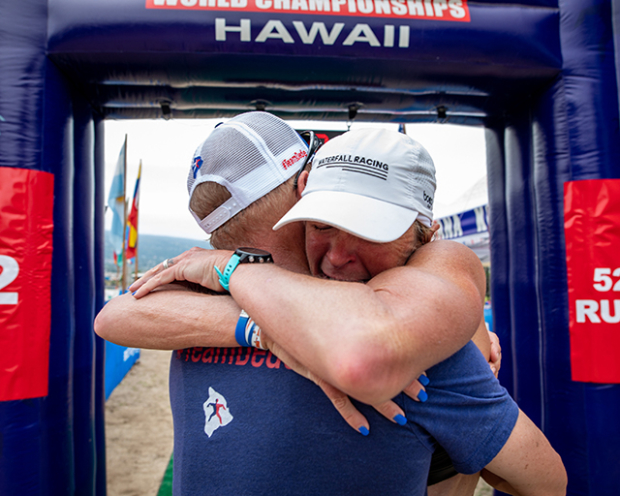
ST: With 2023 now upon us, what is next for you in terms of a big event on your calendar.
Dede: I’ve given it a bit of thought certainly, but haven’t spoken to my coach Julie Dibens yet, so I have no firm plans, but I’m excited to get home and get stuck back into training after a great Holiday break with family.
ST: How much of your calendar is typically fully scheduled and how much of it is winged or late added? And is that something that has changed over the years?
Dede: I think we start most years with a plan, but we’re flexible if things change. I think earlier in my career, I was a bit better at sticking to the plan, but as I’ve gotten older, I’ve been forced to respond to what my body is giving me at any given time. I’m less likely to force myself thru a niggle for the sake of making a start line. I’ve learned to be (a little bit) more patient.
Another big difference is that there are also a lot more racing options now, so that changes things a little bit too. In other words, I’ll keep my dance card open if the PTO reaches out and wants to invite me to Collins Cup. More seriously though, because there are so many race options, if one doesn’t fit, there’s another opportunity right around the bend.
ST: In late 2022 you tackled the Ultraman World Championships and grabbed the win in course record time. Would you consider this race your season highlight or was there something else you look fondly back to?
Dede: Winning the Ultraman World Championship and going faster than anyone has ever gone on that course was definitely the season highlight. So much of my year was geared toward that performance in Hawaii, so it was super satisfying to have it come together across those epic 3 days of racing. My year had gotten off to such a shaky start with a puncture at Challenge Miami and then a collapse in T2 at IRONMAN Texas. It wasn’t exactly confidence building those first few months. To have finished the year with an 8th at Lake Placid, a 4th at Augusta 70.3 and a win at the Ultraman World Championship, I can say we built momentum and finished on a high.
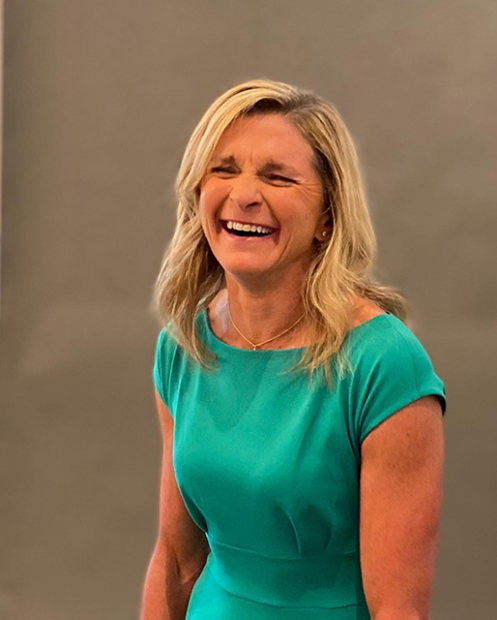
ST: What about the collapse in T2 in Texas? Did you ever learn what went wrong and how to avoid it in the future?
Dede: We spent a lot of time doing all the appropriate tests to rule out the super scary stuff. Lots of heart and brain tests. Thankfully all clear on those things.
So ultimately we will never know for certain. But I got a clean bill of health as a result.
The whole event was a reminder to listen to the cues your body is giving you. I knew late into the bike that something was wrong. I was sort of spacey. Not focused. Feeling dreadful. But instead of taking a minute and asking, How do I fix this? What does my body need? I simply carried on pushing a pace and looking for a gear I thought I should have had, but for some reason didn’t. It was a lesson that there’s only so much pure determination and will power will give you.
ST: In 2019 you raced Ultraman Florida and maybe you can talk about what got you started on that ultra-distance journey.
Dede: I’ve had it said to me more than a couple of times by more than a couple of coaches in more than a couple of sports that I get better as the distance gets longer. It’s sort of been a running joke. My Stanford swim coach told me that if the mile backstroke had been an Olympic event, I might have turned out to be a good swimmer; the curse of being a backstroke specialist, but with the physiology of a distance swimmer. In my early triathlon years, my first coach, Karen Smyers always used to tell me on group rides to just hang in there for the first 2 hours and let the boys wear themselves out. I’d always seem to come into my own in hour 3, 4, and 5. So when I was spending time in Tucson back in early 2014 or 2015 and tagged along with best buddy, Hillary Biscay to hear her give a talk about her Ultraman experience, I tore myself away from the free snacks in the back long enough to be totally sucked into her whole story and experience. I was gobsmacked. It took several years for me to finally muster the courage to sign up, but in 2019, I finally did and raced Ultraman Florida in 2020. Since I signed up, there have been several times where I’ve wondered if I should thank Hillary for the inspiration or smack her for not talking some sense into me!
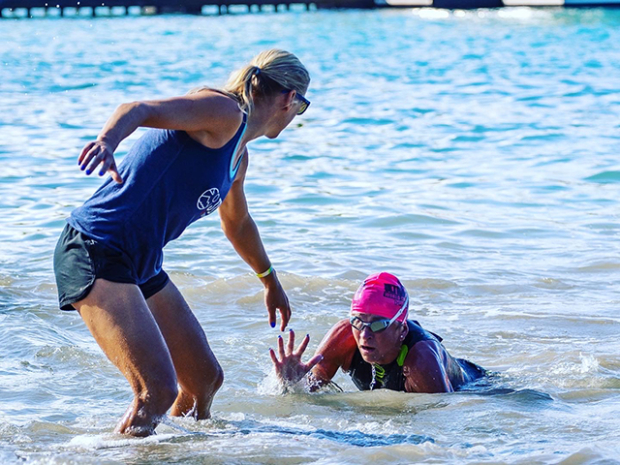
ST: Very funny. Could you talk about how you prepped for the Ultraman Championships?
Dede: I’m not sure we have the time or the space to share exactly how much went into my preparations for Ultraman, even with 30 hours and 2100 miles of driving to go. It was a monstrous undertaking. In retrospect, the pandemic was a bit of a blessing. It gave me a much longer runway to play with, than if I’d raced Ultraman Florida in February of 2020 and then attempted the World Championship in November. I had so, so much still to learn. While I set the World Record in Florida, I made so, so many mistakes. The longer runway gave me time to sort my nutrition and trust me, there was a lot to sort. I was introduced to my nutritionist Andrew Dole and it’s been a work in progress ever since. The longer build also allowed me time to go out to Hawaii for a course reconnaissance trip. It was a huge investment, but it paid off monstrously. I’ve been to Hawaii gobs of times; for racing, for training camps, for commentary responsibilities, but in all that time, I’d spent very little time OFF of the Ironman course. And Ultraman, for all of Day 1 and Day 2 is pretty much everything on the island BUT the Ironman course. In September, I went to Kona, before the buzz of the Ironman World Championship began and I got stuck into a solo training camp to spend as much time as possible on the course. Doing long 2-hour open water swims in my wetsuit. How would that make me feel? To ride a bulk of both days of the bike course and what I didn’t ride? I drove. And then to spend time running out on the Queen K highway past the Energy Lab. It was completely demoralizing. I was terrified that the course was too hard and that I could never do it. But at least I knew what was in store. That trip allowed me to go back to Boulder and with Julie, concoct a program for that final push that was very specific for the course itself.
The 2-year postponement also gave me time to get stronger. Stronger to be able to endure the demands of training for it, and stronger to be able to stand of to 3 really hard days of racing and not wear the effects of the prior day as much. My strength coach, Kate Ligler was so specific with our preparations in the gym. I went into that race the strongest I’ve been in my life.
We thought through all the logistics of the race; booking accommodations, assembling a crew and sorting each and every detail of the race. We tried to anticipate as much as we could as to what might happen across those 3 days and how to manage it. I had spreadsheet after spreadsheet of logistics and organization.
So, yeah, there was a lot involved.
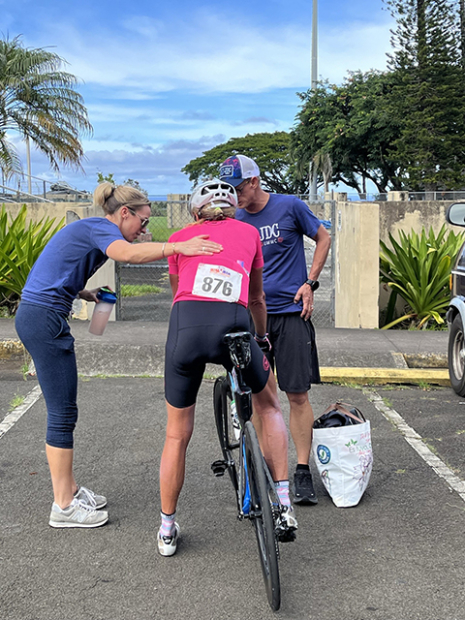
ST: How much time these days do you spend in the pool, cycling and running, and do you do other strength or cardio work?
Dede: My training is going really well. I’m on a bit of break now, obviously, but slowly building back toward 2023. A lot of people assume that, given my age, that I’ve backed off my volumes, or my intensities in training. Quite the contrary, actually. By placing an increased focus on all the little details; sleep, nutrition, physical therapy and not just the kind you do when you are injured, the kind you do so you don’t get injured…or at least hopefully get injured less. Mobility and strength? I think I’m training at some of the highest levels of my career and with greater consistency. My focus on Ultraman did take some of my aerobic volumes up; lots of 7 and 8-hour L2 rides, for example, but in the midst of all that, I had one of the best 70.3 race performances I’ve had in years. So maybe some lessons learned there as well. I am training as much and as hard, and in some case more than I have at other points in my career because of the attention to detail and a heightened focus on the little things. Turns out? They really do matter.
ST: In terms of cycling and running, how much of it is indoor, and if indoor what do you use?
Dede: This will depend largely on the time of the year. Somewhat obviously, winters in Boulder keep us indoors more than in the summer months. Still, even in the winter, we are outdoors running quite a bit, so long as roads are safe. We may swap in some treadmill sessions over track in the winter months. And thru most winters, we’re still able to sneak out on the roads for rides 1-2x most weeks depending on weather patterns. Sometimes we’ll get slammed and be indoors for 2 weeks, but then we catch a good week and we’re outside for the entire week. In the summer, we’re almost entirely outdoors, but I still do 1x indoor trainer session. We have JD Crew group Zwift rides fortnightly, because it’s fun to connect with some of the athletes who aren’t local and let’s face it, trainer riding makes you strong! So even in summer, I’ll hit up the trainer once a week. Same with the treadmill. In summer, I’ll rotate in about one treadmill session per week. Sometimes because it’s just easy to lock in a pace and go on the treadmill. Other times, because I’ll hop on the Lever for some over-pace work, or to lighten the pounding on a recovery run. I’m #notsponsored by a smart trainer or treadmill company, so no shouts out there.
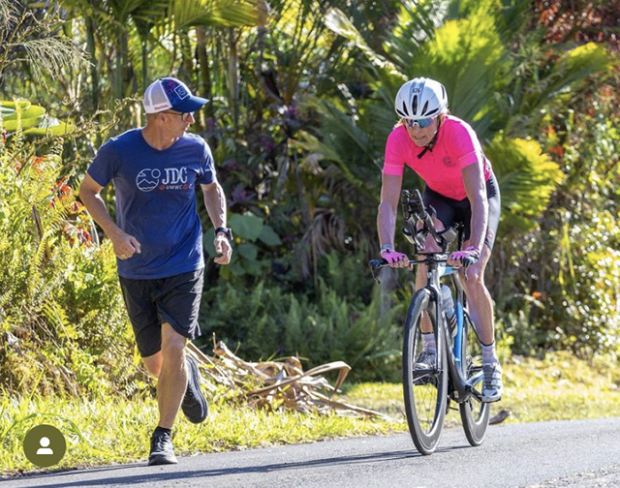
ST: The Ultraman World Championships take place over 3 days. How hard is it to get up each of these days to get fully motivated, and how important is the crew?
Dede: I was hugely motivated for this event, so I was really excited each day. And my crew? My crew! I had other athletes in the race ask if they could hire my crew in future years. My crew brought it 100% across each day of racing. The executed with military precision and a level of professionalism that made me both proud and inspired. At the same time? Every time my crew vehicle went by me, leap-frogging to the next stop, the laughter coming out the windows made me jealous. I’d said at the start that I was super serious about my intentions for the race. I wanted to win it, and I had some pretty unbelievable competition; Tara Norton? A 2x Ultraman World Champion. Leanda Cave? A 4 x World Champion across every distance in triathlon. I’ve been an athlete for most of my 52 years of life and I was a world champion at exactly NOTHING. I took everything about this event seriously. Including my crew selection, but I also told my crew, that for this event to be remotely tolerable? We had to make it FUN. And boy did they deliver. A perfect balance between professionalism, respect for the seriousness of the race, the severity of the challenge and humor and laughter all the way. I love the challenge of Ultraman and it takes you to some deep, dark places in your soul. But what I love most is that it takes our individual, and often times selfish sport and makes it a team event. And my team was World Championship caliber. I don’t say that I am a World Champion, I say that we are WORLD CHAMPIONS because my crew was 100% a part of the whole effort and experience; not just those 3 days, but in the build up to the race as well.
ST: Talk about the bike you rode and if you made any adjustments for the lang haul distance.
Dede: I rode a Trek Speed Concept. I’m not sponsored by Trek, but I love the bike, I ride it pretty OK, and while not properly sponsored, I’ve gotten a lot of help from the brand, as well as from the local Trek Shop in Boulder. They are very good to me.
I dressed my Speed Concept in a Hunt Aerodynamicist Carbon Tubeless wheel set.
I made exactly zero adjustments, other than I swapped out my aero helmet for an aero road helmet for cooling. That was at Matt Bottrill’s recommendation. He’d advised fellow Ultraman athlete Rob Gray, and Rob is a crazy successful Ultraman guy, so I appreciated the #protip.
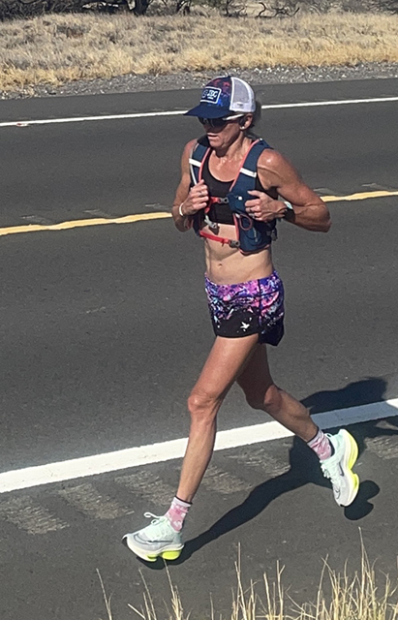
ST: You also announce for IRONMAN and seem to enjoy that gig. How much time do you spend each year doing that?
Dede: As much time as they’ll allow me to! I really enjoy the commentary. I actually just listened to a podcast during our road trip, that went into detail about how much our commentary sucks. Thanks, guys. Appreciate it.
I take my commentary role very seriously. Live coverage of so many IRONMAN races is a real opportunity to showcase the talent and stories of the great athletes in our sport. I study for hours for each race, doing research on as many pros as I can to see what they’ve been up to and what might be relevant or fun to bring up during the coverage. I check their socials for what they’ve been up to and will reach out to them for anything they want to share about their preparations. I listen to podcasts they’ve done recently, if there are any. I chat with JD Crew squad-mates about their picks for a race to try to get a different point of view. During the race, I try to educate the viewers about things the pros are doing and hypothesize as to why that might be.
Ultimately, I am a huge fan of our sport, and being given the opportunity to celebrate the best in our sport executing their craft? It’s a joy and a privilege and I take that seriously. And yeah, sometimes I need to grow a thicker skin. Honestly, I love constructive feedback on things people would rather hear me talk about, when I mis-pronounce names, or mis-state stats. And I’ll be happy to debate tactics and opinions. That’s what it’s all about. But when someone just mouths off and says my voice sounds like nails on a chalkboard (true story), unfortunately, there’s not much I can do about the sound of my voice, and so that’s when I feel like it just gets nasty. But I love doing it and I’ll continue to be a part of that great team for as long as IRONMAN will have me. It’s a great opportunity and a great team.
I typically let the IRONMAN team know my own race schedule, and they do a wonderful job of slotting me in where it fits and doesn’t impact my racing or big training blocks, and then Julie does a wonderful job at making it fit with my training as well.
ST: Sometimes race announcers get mocked for certain things they say on air, but it is not easy to talk continuously for 5-12 hours depending on the race. Does it come naturally to you?
Dede: In some ways? Yes. And that was surprising to me. I’m actually quite introverted. I don’t like talking that much at all. But it all comes back to the fact that I am a diehard fan of our sport, so I get really fired up watching races unfold. I get really excited watching someone run thru the field or seeing someone smash a course record in a breakthrough performance. And I live and die with every puncture and bottle launch. I feel what the athletes are feeling because I’ve lived it so many times myself. Well, not running thru the field….I’ve never done that in my life, but I dare to dream. In very many ways, I do find talking for 5, 6, 9, 10 or 11 hours straight about triathlon and some of our sports greats easy. I get quite wrapped up in it.
I was asked to do a TED talk earlier this year and that was torture for me. I asked a lot of friends for a lot of help to prepare. They all seemed baffled by how I could be quite so flummoxed by talking for 15 minutes when I routinely talk for 10+ hours. But it’s the triathlon aspect that I love, so it comes easily when I’m talking about triathlon. Not so much so when it’s for social reasons, or to talk about myself. I’d sooner die.
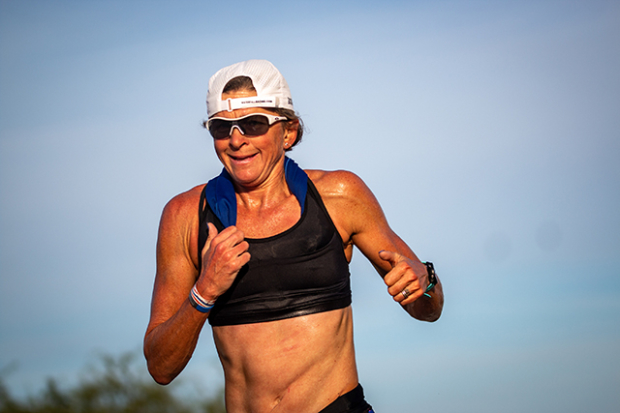
ST: I think you were a vegan for a long time but now have returned to eating meat. When did you first start with the vegan lifestyle and what prompted you to return to meat? Or was this more so a floating not so strict situation?
Dede: I was a vegetarian, not a vegan. And that started back in high school and was as much born out of the fact that I went to boarding school and found most of the items in the hot food line to be rather unappetizing. Tuesday Mystery Meat? I never warmed to it. So I stuck to the safety of the salad bar and the cereal bins. It was a taste thing as much as anything. That became even more ingrained in college as well. I was picky about the quality of the food.
When I started racing triathlon, I got away with a shockingly poor diet. Not poor in that I was eating chips and Ben & Jerry’s every night, but poor in that I was not fueling properly with a variety of good nutritious foods. I ate for simplicity, speed and minimal fuss. And then I started getting injured. A lot. With the help of my fabulous doctor, we sorted that I was under fueling; not getting a good variety of nutrients and not getting enough protein. As such, my body was sort of eating itself and I was breaking down.
I started adding foods back into my diet that I’d originally scorned because they looked sad and sort of gray in the school cafeteria food line. Lo and behold? I stopped getting as injured as much. My energy was better and my performances started to improve.
I now look at nutrition like I look at my training. For example? I don’t love the track. But I know that track sessions are good for me and ultimately make me a better athlete. As far as performance goes? It’s a necessary evil so to speak. It is the same for me with fueling. I may not love everything I’m eating? But if it’s part of the process of making me a successful athlete? Then it’s what I will do.
I’ve taken a lot more control over the quality of foods I’m eating and how they are prepared. Partnering with Certified Piedmontese is an example of that. Beef was my #1 enemy thru my teens, twenties and really up until recently. It was chewy, fatty and it never set well in my stomach. But when I tried Certified Piedmontese beef. It really is better beef. It’s not just a slogan. It’s the truth. It makes a lot easier to fuel properly when your food sources are high quality, clean, good foods. They taste better and they fuel you better. This may seem Captain Obvious to most people, but it’s been a revelation to me. I just never bothered to give it much thought. It’s a journey for me and I’m still learning.
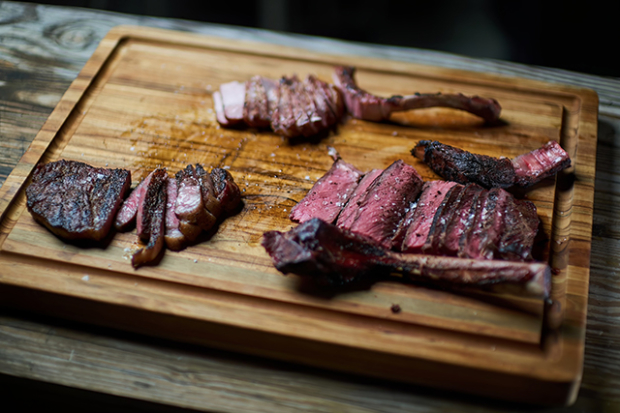
ST: In your house who cooks, and do you both enjoy the same type of meals?
Dede: I don’t cook toast. Truly. I’m disgraceful. My husband is the foodie. He gets it from his dad. His dad retired from his real job and in retirement, started working in the kitchen of his favorite restaurant in Washington DC. He’d eaten there for years for business lunches and dinners and had gotten to know the owners and the chef. He asked, somewhat sheepishly when he retired, if he could just sort of go hang out and chop a thing or two, stay out of the way and observe and learn. My husband is the same way. He really enjoys meal planning, preparation, presentation and all of that. I love that he loves it and I’m happy to have him take responsibility for most of it.
For several years, now, we’ve used meal kits for a few nights of the week: Sun Basket, Hello Fresh, Home Chef, etc. We rotate around so we get a variety. I pick the meals so we get things I won’t turn my nose at. Dave will eat anything. Except mushrooms. Don’t feed the kid a mushroom. The meal kits are so simple. Dave has a big and stressful day job, so using the kits takes some of the planning and shopping out of the mix, eliminating some stress and time from the equation. We’ll spend 20-30 minutes in the kitchen together making dinner. I’ll chop a thing or two to try to be helpful. Sometimes I’ll intentionally stuff something up so he’ll just kick me out and take over. It’s actually a great way to unwind our day and spend some time together and I’m getting better nutrition all at the same time. You won’t find me working in a restaurant kitchen any time soon, though.
ST: Well, is there anything else we should know?
Dede: 425 miles to go!



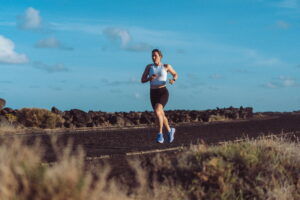
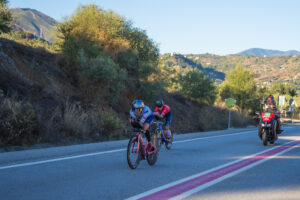


Start the discussion at forum.slowtwitch.com